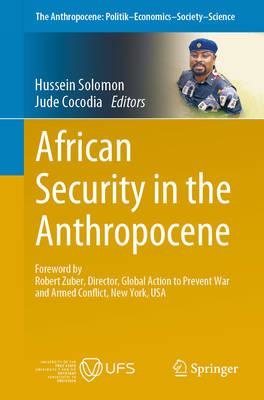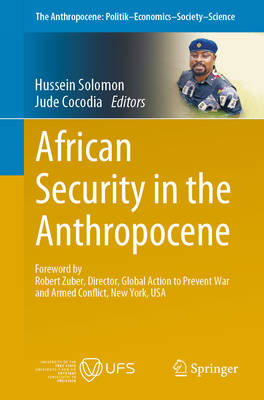
- Afhalen na 1 uur in een winkel met voorraad
- Gratis thuislevering in België vanaf € 30
- Ruim aanbod met 7 miljoen producten
- Afhalen na 1 uur in een winkel met voorraad
- Gratis thuislevering in België vanaf € 30
- Ruim aanbod met 7 miljoen producten
Zoeken
African Security in the Anthropocene
€ 167,95
+ 335 punten
Omschrijving
Much has been written on security in Africa--its democratic deficit, poor civil-military relations, and myriad conflicts--but these are often treated in isolation from one another. This book takes a different approach, as it links all of these issues to the dynamics of the Anthropocene. Penned by African scholars on the continent and in the diaspora, it examines the different challenges not as separate entities but as outcomes of the Anthropocene Age. In this geological epoch, humans have become a global force--unfortunately, not necessarily for good. The interaction between humans and the climate, the effects of waste, the impact of pollution on marine and terrestrial ecosystems, the loss of biodiversity, and the change in the chemical composition of the soil, oceans and atmosphere are key identifiers of the age of the Anthropocene. This has fueled conflict and instability from the vast swathes of the Sahel to Somalia. Responding to these issues of insecurity without understanding their inter-connectedness and how this relates to the environment can only result in failure. From this perspective, the current structures in place are inadequate for the task of confronting insecurity at the state and continental levels, as represented by the African Union. What is needed is a radical reevaluation of Africa's security architecture and approach to security. This necessitates pooling sovereignty on a continental and global level. It necessitates less state-centric responses that include civil society and the business community as equal partners of states in order to collectively confront insecurity in the age of the Anthropocene.
- The authors are academics, policy makers and military veterans who have worked in building capacity on the African continent- The book is comprehensive in scope, strong on theory, pragmatic in policy and reflects experience from the field.- The authors approach makes the book easy, interesting and intriguing.
- The authors are academics, policy makers and military veterans who have worked in building capacity on the African continent- The book is comprehensive in scope, strong on theory, pragmatic in policy and reflects experience from the field.- The authors approach makes the book easy, interesting and intriguing.
Specificaties
Betrokkenen
- Uitgeverij:
Inhoud
- Aantal bladzijden:
- 188
- Taal:
- Engels
- Reeks:
- Reeksnummer:
- nr. 36
Eigenschappen
- Productcode (EAN):
- 9783031251504
- Verschijningsdatum:
- 12/03/2023
- Uitvoering:
- Paperback
- Formaat:
- Trade paperback (VS)
- Afmetingen:
- 156 mm x 234 mm
- Gewicht:
- 290 g

Alleen bij Standaard Boekhandel
+ 335 punten op je klantenkaart van Standaard Boekhandel
Beoordelingen
We publiceren alleen reviews die voldoen aan de voorwaarden voor reviews. Bekijk onze voorwaarden voor reviews.







